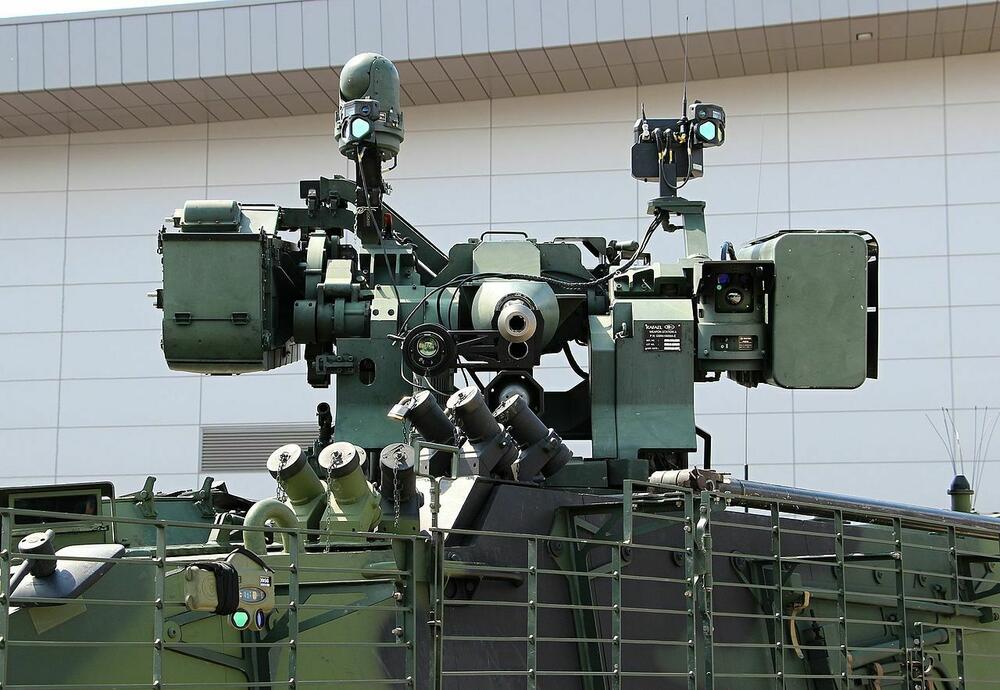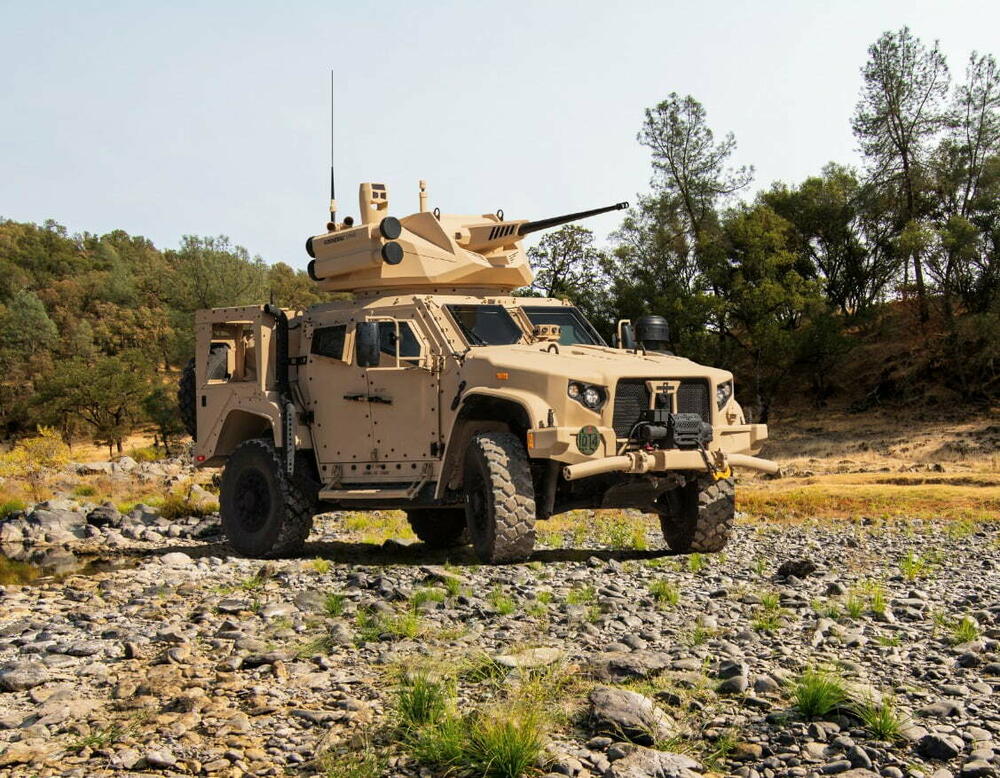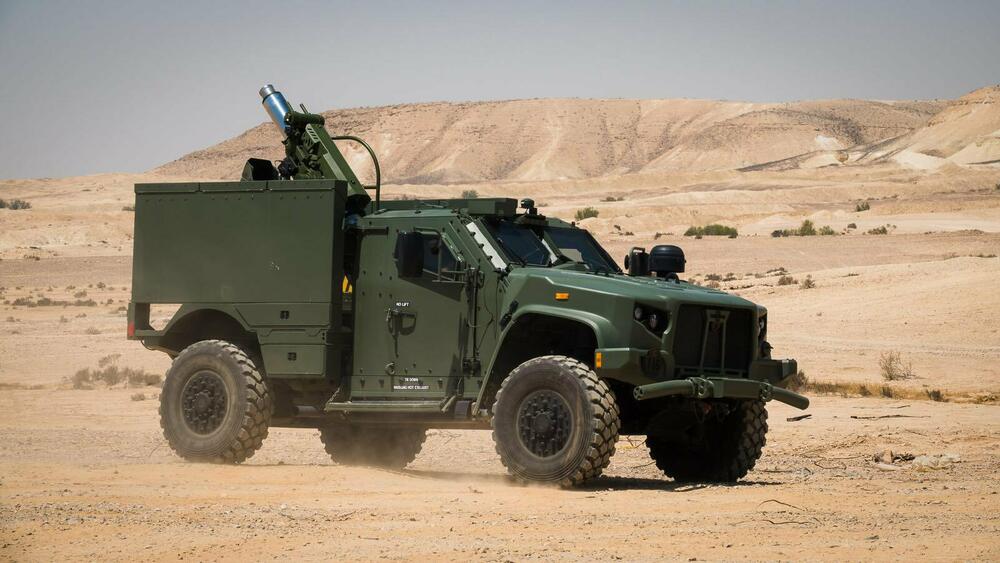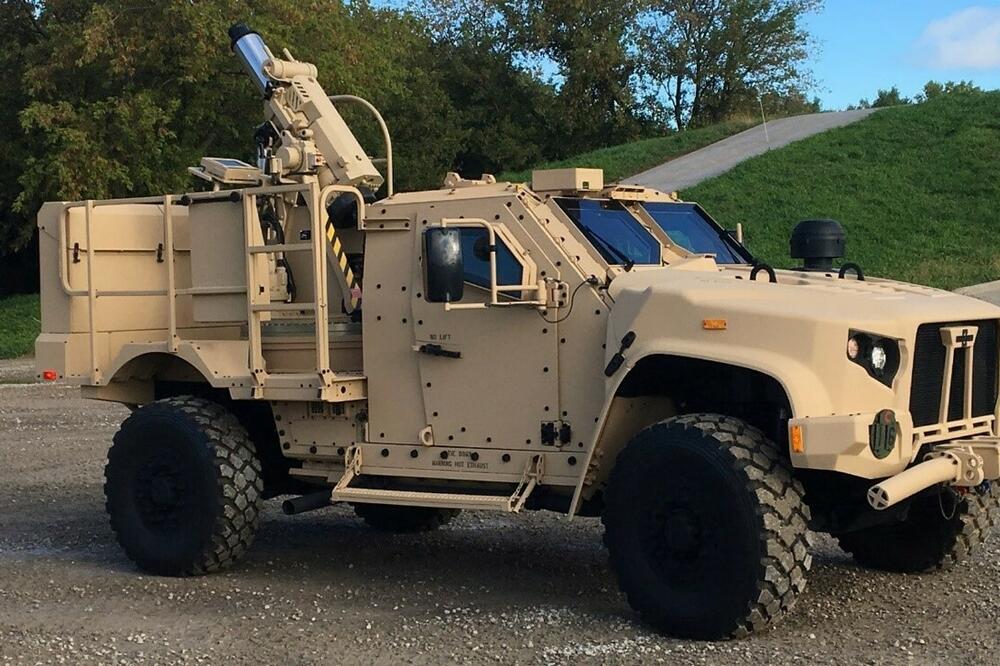Although the events in Israel have somewhat disrupted the planned activities as part of the military cooperation between Montenegro and that country, the procurement of weapons and equipment for the needs of the Army of Montenegro (ACG) is being carried out according to plan.
On the other hand, the planned training of a number of VCG members at the IMI Academy in Tel Aviv had to be postponed due to the war between the Israeli Defense Force (IDF) and the Palestinian paramilitary organization Hamas.
Thus, at the end of last year, the Israeli company "Elbit" delivered the last five out of a total of 55 ordered, the so-called remote-controlled RCWS combat stations with 12,7 mm machine guns, intended for installation on lightly armored JLTV patrol vehicles that the VCG has in its composition.
The contract with "Elbit" worth 35 million dollars on the purchase of RCWS for American light armored general-purpose vehicles that are part of the First and Second Infantry Companies of the Croatian Armed Forces was signed in 2019. "Elbit" committed to the full integration of stations on the vehicles it produced. the American company "Oshkosh" within three years, and providing logistical support for seven years. Although all 55 RCWS stations were delivered within the agreed time frame, their installation on all 55 planned vehicles was not completed due to the late delivery of the JLTV from America. By the end of 2022, only 30 out of a total of 67 ordered vehicles have been delivered, so the pace of their upgrading to "Elbit's" RCWS stations, which is done in Montenegro when the vehicles are delivered from the USA, is behind schedule.
This was confirmed to the "News" from the Ministry of Defense (MOD), where, however, they were not in the mood to talk about the specific numbers of RCWS installed so far.
"The installation of remotely controlled combat stations of the company "Elbit" on JLTV light armored vehicles is a complex process, conditioned by the delivery of not only stations but also vehicles. Since the part about the delivery of the vehicles is going slower than expected, due to known reasons, mainly because of the war in Ukraine, the installation of the stations has not been completed either, although they were delivered to VCG within the stipulated period. Due to the obligations assumed by signing the contract in the field of keeping business secrets, we are not able to talk about the exact numbers installed and those that still need to be installed, nor could this information change the essence of the matter", said the Ministry led by the Minister Dragan Krapović (Democrats).

Since April of last year, the USA has started supplying Ukraine, which is defending itself against Russian aggression, with a larger number of JLTV vehicles, hence the late deliveries of those military vehicles to other countries that ordered them earlier.
The MOD points out that some of the "Elbit" RCWS stations now installed on Montenegrin JLTVs have proven to be "an efficient assembly, relatively easy to use and reliable in use".
"It is known to the public that since January 2023, Montenegrin soldiers have been carrying out tasks within the framework of NATO activities on the eastern borders of the Alliance with these assets. Disposing of one's own means is of particular importance for members of the Army, both in terms of their use during preparation and training, as well as when engaging in important tasks. This gives them security, makes them safer and more respected among the soldiers of other countries, because it is about the means used by members of the armed forces, which are significantly more numerous and better equipped," the MOD pointed out.
Of the JLTVs delivered so far from the USA, 10 of them arrived in Montenegro in the so-called "Heavy Guns Carrier" (HGC) variant intended for the subsequent installation of heavier artillery or rocket weapons, compared to JLTVs in the General Purpose (GP) variant, on which the "Elbit" RCWS stations are subsequently installed.
Part of those HGC vehicles will also be armed by the Israelis for Montenegrin needs, because the Montenegrin ministries of defense and finance are currently negotiating with the Israeli government about a new credit arrangement worth 20 million dollars, which would buy four SAMSON 30 (Katlanit) combat stations with a 30 mm automatic cannon, and which are installed on JLT HGC vehicles. They are produced by the Israeli company "Rafael Advanced Defense Systems".
In addition, four mobile launchers for installation on JLTV HGC vehicles, for anti-armor missiles of the SPIKE type, are intended to be procured from "Rafeal". In addition to the combat stations, launchers and rockets, the price of this arrangement also includes logistics packages, transport, personnel training and the necessary trainers.

The MOD did not precisely answer the question of "Vijesti" how many Montenegrin JLTVs will be armed with anti-armor missiles, and how many of those missiles will be ordered from Israel. Unofficially, it is a total of 32 pieces of SPIKE rockets in LR, i.e. long-range variants.
SPIKE LR is an anti-tank missile with the so-called with a tandem warhead that can hit a target at a distance of up to 5.500 meters, and the operator has a permanent connection with the missile via an optical cable. In addition to targets on the ground, this missile can also target low-flying helicopters. The warhead of this missile is capable of penetrating steel armor over 700 mm thick.
In addition to these, the MoD also ordered 11 SPIKE anti-tank missiles in the SR variant (short range - up to 1.500 meters), which are intended for use directly on the ground by infantry units.

The MOD told "Vijesta" that because of membership in NATO, Montenegro does not need larger and more expensive systems for anti-armor combat, but only those assets that are sufficient on the battlefield for the (self) protection of our ground troops.
"Arming with self-propelled or portable anti-armor systems is conditioned, in addition to the above, by the type/type of unit that is a priority in protection. "Experiences from modern wars, as well as those that took place at the end of the last century, indicate that the potential vulnerability and sensitivity of artillery and light armored infantry vehicles is one of the most important criteria when planning the use of anti-tank forces," they said.
If the ground forces, as they added, have self-propelled artillery and light armored infantry vehicles, as will be the case with the Montenegrin forces after the modernization process is completed, then this is enough as a parameter to focus on self-propelled anti-tank systems.
"In addition to them, the VCG plans to purchase, to a lesser extent, easily portable anti-armor missile systems, all within the agreement for the purchase of SPIKE anti-armor systems," the MoD explained.
In the procurement of self-propelled artillery, Montenegro also relies on Israel
As for self-propelled artillery, the MOD and VCG trust the Israelis again, because in May of last year a contract worth 22 million dollars was signed for the supply of 120 mm self-propelled mortars. These are autonomous mortars of the "Elbit Soltam Spear" type with the so-called low recoil, tools adapted for installation on light combat vehicles such as JLTV used by the Montenegrin army.

These high-precision artillery tools are very mobile, they take up the firing position and leave after the effect within only 60 seconds, which makes it much more difficult for the enemy to find and eliminate them. Their rate of fire is up to 16 shells per minute, while for aiming they use modern fire control systems with GPS and inertial navigation. One mobile mortar "spear" is operated by a crew of three soldiers, and this tool can shoot targets up to 10 kilometers away, with all fired shells falling within a circle with a diameter of 30 meters.
Referring to the confidentiality of data agreed with Izrealci, the MOD did not want to answer the questions of "Vijesta" about the number of self-propelled mortars they buy from "Elbit", as well as about the accompanying ultra-modern electronic fire control equipment. command-information and early threat detection systems still ordered.
They did not answer whether, along with the mortars, some of the high-precision guided weapons such as "stylet", "rapier" and "iron sting" were purchased, which these weapons fire with an additional package of equipment for their laser and GPS targeting.
However, for the introduction of these mono-launchers into use, Montenegro will have to change the upcoming part of its still undelivered order of JLTV vehicles from America or to buy special additional vehicles because these artillery tools can only be installed on the so-called "utility", that is, a pickup variant of JLTV vehicles that Montenegro has not ordered so far.
"The expectation is that the SPEAR model in combination with the JLTV will meet the needs of the Montenegrin artillerymen. When it comes to 120 mm ammunition, we can say that all aspects that make the system complete were taken care of," said the MOD.
They pointed out that regardless of the introduction of these modern artillery systems, the existing towed version of the 120 mm caliber mortar, which was inherited from the former JNA, and with it the existing mortar ammunition of that caliber, which was previously in VCG warehouses.
"Therefore, the implementation of the contract with the company 'Elbit Systems' on the delivery and installation of 120 mm caliber mortar systems on the light armored vehicles of the JLTV of the Army of Montenegro is proceeding according to plan. Currently, the production of mortar systems is in the phase, which should, in accordance with the agreement, be completed by the middle of 2024, when the integration of the system with light armored JLTV vehicles in Montenegro is planned", they said.
After the completion of the integration of the mortar system and JLTV vehicles, there will be training for the members of the Croatian Armed Forces for the use and maintenance of the system, as well as the implementation of shooting in Montenegro, or in one of the allied countries in the surrounding area, if conditions are not created for shooting at the training-shooting room that is the Army's allocated for that purpose, the MOD explained.
Israel's arms industry is one of the best in the world
Israel has one of the most technologically advanced arms and military equipment industries in the world and produces literally everything from ordinary automatic rifles, through modern electronics and sensors, to satellites and strategic missiles capable of carrying nuclear warheads at distances measured in thousands of kilometers. Almost all of these means and weapons have the so-called combat approved status, which means that they have been used and successfully proven in practice in concrete combat actions.
The MOD points out that today there is probably no army in the world that does not suffer some of the consequences of the war operations in Ukraine and Israel when it comes to the training of personnel or the delivery of ordered equipment and resources.
They state that it is known that countries such as Israel play an important role in supplying weapons and military equipment to many armed forces in the world.
"Companies from Israel have broken into numerous markets thanks to production oriented to combat weapon systems, equipped with modern technological solutions and supported by experts in various fields who are able to adapt prototypes to customer requirements and required standards. Although this country is not a member of NATO, it follows the standards of the Alliance and meets all the high requirements in production", said the MOD.
They point to the very competitive price and other conditions provided by companies from Israel, among which the time and accuracy of delivery play a very important role, as well as monitoring the cycle of stable and reliable maintenance at least as long as the warranty period lasts.
"Although it could be expected that the war in Ukraine, and especially the war in Gaza, would postpone the delivery dates, as things stand now there will be no postponement of the agreed deadlines specified by the agreement between the Ministry of Defense and the Israeli company 'Elbit'", the MOD points out.
Bonus video:





